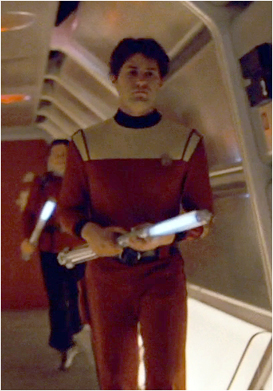By Rob Heyman
It seemed the punches just keep coming this year: Leonard Nimoy, Maurice Hurley, Harve Bennett, and now James Horner. Star Trek certainly felt the blow from the passing of some noted talent. I could spend an entire column writing just about Nimoy.
I could probably spend more than a few paragraphs taking about Hurley, too, as someone who left an indelible mark as a producer on Star Trek: The Next Generation (we owe the Borg to him).
I wanted to donate this column to Horner, because composers are often the unsung heroes of cinema. Horner certainly wasn’t an unknown, however. He’d composed the score for Star Trek: The Wrath of Khan and The Search for Spock, thus leaving an indelible mark on the franchise.
Most people probably know him as the guy who composed Titanic, for which he won a couple of Oscars. He later went on to compose Avatar and was keeping pretty busy with upcoming assignments, including the Avatar sequels.
Like Jerry Goldsmith and John Williams, Horner became a bit of celebrity, and his acclaim was largely justified. Say what you will about his penchant for recycling his own music (listen to the score to Wolfen and you’ll hear some familiar melodies from The Wrath of Khan) — Horner was an unquestionable talent. I can’t imagine Field of Dreams without his score.
He delivered an equally moving contribution to the 1989 film Glory. And then of course there’s Titanic. Many directors partner with a loyal composer. Spielberg has John Williams, Robert Zemeckis has Alan Silvestri, and M. Night Shyalaman has James Newton Howard. Horner was a favorite of James Cameron and Ron Howard.
These partnerships helped inform our fascination, as film geeks, with cinema and provided a kind of compass to what we could expect musically whenever a new project was announced by one of these directors.
Sadly, it seems, we don’t really talk about film composing these days as we once did. The sort of classic, sweeping, epic landscapes that were painted musically in movies like Dances With Wolves or romantic melodramas like Titanic are long gone.
Horner was a part of a Golden Age of film scoring that seemed to end about 15 years ago. There’s been the occasional speck of light poking through the darkness. Michael Giacchino delivers some heavy melodies for the new Star Trek movies, but they certainly lack the bombastic assault of Horner’s Wrath of Khan score.
Horner had a way of nailing the emotional center of any scene he composed – whether it was Spock’s death and eventual “burial” on Genesis in Khan or Kevin Costner playing baseball with his dead dad in Field of Dreams.

It’s my hope that, perhaps with the upcoming Star Wars movies and John Williams’ work therein, film composing will find its way back on the radar and a return to the glory that Horner helped shape over the past 30 years.
I got the news about the plane crash from my longtime friend on Monday night. At that point, it was still unclear as to whether Horner was the pilot who died (as this evening, of course, that news has been verified).
The first thing I did was go on Twitter in the hopes of finding some real-time update. One thing that became clear to me was that Horner had an incredibly fan base, all of whom poured out their sadness on social media.
For my generation in particular – fans who grew up on the movies Horner composed – the loss of Horner is a powerful one. This is certainly a time to celebrate his music and the contribution he made to cinema. Very few composers find their way into the public consciousness by virtue of the work that they have done.
Horner was one of them.
